The global DNA methylation conversion kit market is valued at USD 243.8 million in 2025. It is slated to reach USD 632.3 million by 2035, recording an absolute increase of USD 388.5 million over the forecast period. This translates into a total growth of 159.3%, with the market forecast to expand at a compound annual growth rate (CAGR) of 10% between 2025 and 2035. The overall market size is expected to grow by nearly 2.59X during the same period, supported by increasing demand for epigenetic research applications, growing adoption of methylation analysis in personalized medicine, and rising emphasis on DNA modification studies across diverse biotechnology and pharmaceutical research applications.
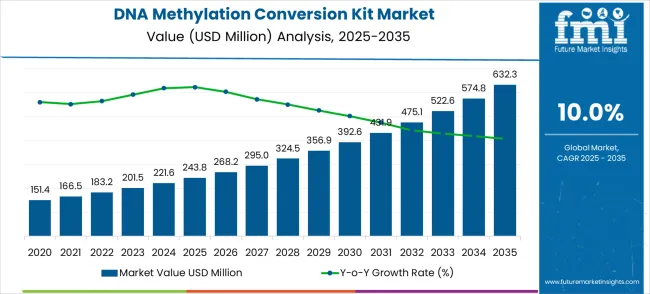
Between 2025 and 2030, the DNA methylation conversion kit market is projected to expand from USD 243.8 million to USD 392.6 million, resulting in a value increase of USD 148.8 million, which represents 38.3% of the total forecast growth for the decade. This phase of development will be shaped by increasing epigenetic research investments, rising adoption of personalized medicine approaches, and growing demand for advanced molecular biology tools that enable precise methylation analysis and epigenetic studies. Research institutions and biotechnology companies are expanding their DNA methylation conversion kit utilization to address the growing demand for comprehensive epigenetic analysis and molecular research capabilities.
| Metric | Value |
|---|---|
| Estimated Value in (2025E) | USD 243.8 million |
| Forecast Value in (2035F) | USD 632.3 million |
| Forecast CAGR (2025 to 2035) | 10% |
The DNA methylation conversion kit market has been positioned as a critical segment within molecular biology and epigenetics, supporting precise analysis of methylation patterns for research and diagnostic applications. Within the epigenetics research tools market, the share of this segment is approximately 13.2%, as the kits enable researchers to convert and analyze methylated DNA efficiently. In the genomics research market, the contribution stands at 11.8%, reflecting their use in studies on gene regulation, disease markers, and epigenomic profiling. The molecular biology reagents market records a 10.5% share, with the kits being essential components for various experimental workflows.
Within the biotechnology tools market, the share is about 9.7%, as these kits complement broader genomic and proteomic research technologies. In the life sciences research market, the contribution is around 8.4%, highlighting adoption across academic and industrial laboratories for advanced DNA methylation studies. Combined, these parent markets account for 53.6%, indicating the entrenched role of DNA methylation conversion kits in modern research ecosystems. The market has been perceived as fundamental for ensuring accuracy, reproducibility, and reliability in epigenetic analysis, supporting cutting-edge research and translational applications in disease biology.
The DNA methylation conversion kit market is poised for exceptional growth and transformation as epigenetic research takes center stage in precision medicine, cancer diagnostics, and therapeutic development. With demand accelerating across research institutions, universities, and biotech companies, conversion kits are increasingly seen as essential tools enabling reliable bisulfite conversion, high-quality DNA recovery, and compatibility with next-generation sequencing workflows.
Rising investments in personalized medicine, multi-omics integration, and large-scale genomic research are fueling adoption, particularly in Asia-Pacific and North America, while Europe leverages its strong life sciences ecosystem. Manufacturers are innovating with automation-ready platforms, high-throughput kits, and advanced chemistries that reduce DNA degradation while improving efficiency. Pathways like NGS-integrated workflows, automation compatibility, and region-specific research expansion offer not just volume growth but also premium differentiation for suppliers. Supportive government funding for biotechnology, rising pharma-biotech collaborations, and growing academic research grants provide structural momentum.
Market expansion is being supported by the increasing global investment in epigenetic research and the corresponding need for specialized molecular biology tools that can enable precise methylation analysis, support comprehensive gene regulation studies, and facilitate breakthrough discoveries across various biotechnology, pharmaceutical, and academic research applications. Modern researchers and biotechnology professionals are increasingly focused on implementing methylation analysis solutions that can provide accurate results, enable reproducible experiments, and support advanced epigenetic studies in disease research and therapeutic development. DNA methylation conversion kits' proven ability to deliver reliable bisulfite conversion, maintain DNA quality, and support downstream analysis makes them essential tools for contemporary epigenetic research and molecular biology applications.
The growing emphasis on personalized medicine and precision therapeutics is driving demand for DNA methylation conversion kits that can support biomarker discovery, enable therapeutic target identification, and facilitate comprehensive epigenetic profiling. Research institutions' preference for molecular tools that combine conversion efficiency with experimental reliability and workflow compatibility is creating opportunities for innovative DNA methylation conversion kit implementations. The rising influence of multi-omics research and systems biology approaches is also contributing to increased adoption of DNA methylation conversion kits that can provide high-quality results without compromising downstream analysis or research reproducibility.
The market is segmented by processing method, application, and region. By processing method, the market is divided into column-based, magnetic bead-based, and others. Based on application, the market is categorized into research institutions, medical institutions, university research, and others. Regionally, the market is divided into Asia Pacific, North America, Europe, Latin America, and the Middle East & Africa.
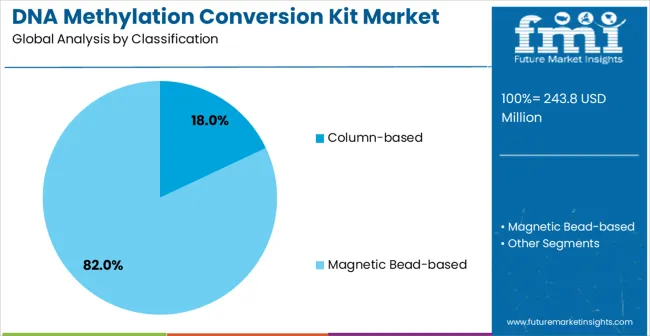
The magnetic bead–based segment is projected to dominate the DNA methylation conversion kit market in 2025, capturing 82% share and reinforcing its role as the most advanced processing technology for bisulfite conversion and DNA purification applications. Research scientists and molecular biologists increasingly adopt bead-based conversion kits for their superior scalability, automation compatibility, and high-throughput processing capabilities. Magnetic bead–based technology delivers efficient DNA recovery, precise purification, and seamless integration with automated laboratory workflows, directly addressing the research need for reproducibility, efficiency, and minimized manual handling in epigenetic analysis.
This processing method segment has become central to next-generation DNA methylation analysis workflows, as it provides unmatched adaptability for both small- and large-scale research environments. Growing investments by research institutions and clinical laboratories in automated, bead-based systems continue to accelerate adoption across molecular biology and epigenetics research. With increasing demand for consistent DNA quality, high recovery rates, and workflow efficiency, magnetic bead–based processing is firmly positioned as the dominant platform supporting comprehensive and scalable epigenetic analysis strategies.
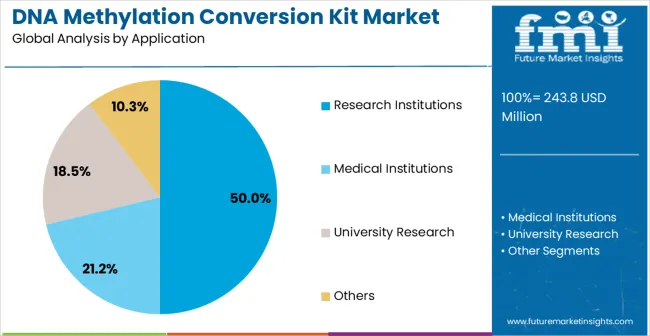
The research institutions application segment is projected to represent the largest share of DNA methylation conversion kit demand in 2025, underscoring its critical role as the primary driver for molecular biology tool adoption across academic research institutes, government laboratories, and independent research organizations. Research institutions prefer DNA methylation conversion kits for epigenetic studies due to their comprehensive research requirements, experimental flexibility needs, and ability to support diverse methylation analysis projects while enabling breakthrough discoveries and publication-quality results. Positioned as essential tools for modern epigenetic research, DNA methylation conversion kits offer both analytical advantages and research support benefits.
The segment is supported by continuous innovation in epigenetic research methodologies and the growing availability of specialized conversion technologies that enable comprehensive methylation analysis with enhanced efficiency and experimental reproducibility. The research institutions are investing in advanced molecular biology programs to support large-scale research projects and collaborative research initiatives. As epigenetic research becomes more sophisticated and methylation analysis requirements increase, the research institutions' application will continue to dominate the market while supporting advanced conversion kit utilization and research excellence strategies.
The DNA methylation conversion kit market has been propelled by growing demand for epigenetic research, disease diagnostics, and biomarker discovery. Laboratories and research institutes are increasingly adopting these kits for high-accuracy DNA methylation analysis and epigenome mapping. Opportunities are arising from expanding clinical applications, personalized medicine initiatives, and increased funding for genetic research. The market is also witnessing enhanced adoption in cancer studies, developmental biology, and neuroscience, as precise conversion kits enable reproducible and reliable methylation profiling across multiple sample types and workflows.
The demand for DNA methylation conversion kits has been driven by the need for accurate, reproducible, and sensitive analysis in epigenetic studies. In opinion, research institutions, pharmaceutical companies, and diagnostic laboratories are increasingly depending on these kits to understand gene regulation, disease progression, and potential therapeutic targets. The ability to convert unmethylated cytosines into distinguishable bases while preserving methylation information is essential for downstream applications such as PCR, sequencing, and genome-wide methylation profiling. The growing focus on cancer diagnostics, neurodegenerative diseases, and developmental biology has further reinforced this demand. These kits are also being favored for their compatibility with diverse sample types, including blood, tissue, and cell-free DNA, which enables broader research applications. The increasing complexity of genetic research and the need for high-precision epigenetic data are fueling the adoption of DNA methylation conversion kits.
Opportunities in the DNA methylation conversion kit market have been strengthened by their expanding use in clinical diagnostics and personalized medicine research. In opinion, these kits are enabling researchers to identify epigenetic biomarkers associated with cancer, cardiovascular diseases, and metabolic disorders, offering insights for targeted treatment strategies. The rise of personalized medicine initiatives, where treatments are tailored based on an individual’s epigenetic profile, has created strong growth prospects for these kits. Moreover, increasing investment in genomic and epigenomic research by governments and private organizations is supporting widespread adoption. The use of conversion kits in developing diagnostic assays, liquid biopsy applications, and preclinical studies further enhances their market potential. The convergence of clinical demand, precision research needs, and funding support is opening significant opportunities for market players.
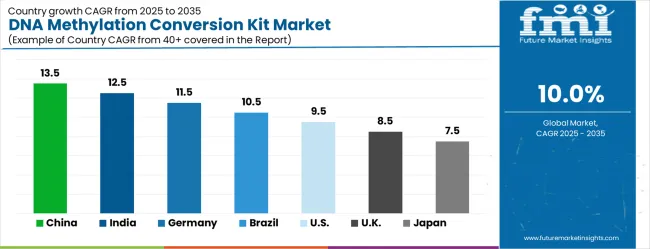
| Country | CAGR (2025-2035) |
|---|---|
| China | 13.5% |
| India | 12.5% |
| Germany | 11.5% |
| Brazil | 10.5% |
| United States | 9.5% |
| United Kingdom | 8.5% |
| Japan | 7.5% |
The DNA methylation conversion kit market is experiencing exceptional growth globally, with China leading at a 13.5% CAGR through 2035, driven by the expanding biotechnology sector, growing research infrastructure investment, and significant focus on epigenetic research and precision medicine development. India follows at 12.5%, supported by rapid biotechnology industry growth, increasing pharmaceutical research activities, and growing investment in molecular biology research capabilities. Germany shows growth at 11.5%, emphasizing advanced biotechnology research and precision medicine applications. Brazil records 10.5%, focusing on biotechnology research expansion and pharmaceutical industry development. The USA demonstrates 9.5% growth, supported by an established biotechnology infrastructure and an emphasis on epigenetic research advancement. The UK exhibits 8.5% growth, emphasizing life sciences excellence and molecular biology research innovation. Japan shows 7.5% growth, supported by advanced biotechnology research and precision molecular analysis technologies. The report covers an in-depth analysis of 40+ countries; the top-performing countries are highlighted below.
The DNA methylation conversion kit market in China is growing at a CAGR of 13.5%, driven by increasing investments in genomics, epigenetics research, and personalized medicine initiatives. China’s expanding biotechnology sector, rising clinical research activities, and growing focus on genetic diagnostics are significantly boosting market adoption. The government’s support for biomedical research, along with partnerships between academic institutions and biotech companies, enhances the use of DNA methylation conversion kits. The country’s robust research infrastructure, combined with rising awareness of epigenetic mechanisms, further accelerates the adoption of these kits in both clinical and research applications.
The DNA methylation conversion kit market in India is projected to grow at a CAGR of 12.5%, supported by the country’s increasing focus on biomedical research, diagnostics, and epigenetic studies. India’s growing biotechnology and pharmaceutical sectors are adopting these kits to enhance precision medicine and genetic research capabilities. Investments in academic and research institutions, coupled with rising collaborations between domestic and international companies, are further fueling market growth. The demand for advanced DNA analysis tools in clinical and research laboratories continues to expand as India strengthens its position in genomics and personalized medicine.
The DNA methylation conversion kit market in Germany is growing at a CAGR of 11.5%, driven by the country’s strong focus on biomedical research, epigenetics, and precision medicine. Germany’s pharmaceutical and life sciences sectors actively adopt these kits to support genetic and clinical research initiatives. Investments in advanced laboratories, research collaborations, and government-funded genomic programs enhance market growth. The demand for high-quality conversion kits is further strengthened by Germany’s commitment to improving diagnostic capabilities and advancing personalized medicine solutions.
The DNA methylation conversion kit market in Brazil is projected to grow at a CAGR of 10.5%, driven by increasing adoption in genomics research, clinical diagnostics, and pharmaceutical applications. Brazil’s expanding research infrastructure and rising government support for biotechnology projects are contributing to market growth. Academic institutions and private companies are increasingly using DNA methylation conversion kits for epigenetic studies, disease research, and personalized medicine. The country’s focus on modernizing research facilities and improving diagnostic capabilities supports steady adoption of these kits across clinical and research applications.
The DNA methylation conversion kit market in the United States is expanding at a CAGR of 9.5%, driven by the demand for epigenetic research, precision medicine, and clinical diagnostics. USA pharmaceutical and biotech companies actively utilize DNA methylation kits for research on gene expression, cancer studies, and therapeutic development. Investments in advanced laboratory infrastructure, government-funded research programs, and academic collaborations support market growth. The focus on personalized medicine and genomic research ensures steady adoption of these kits across research and clinical applications.
The DNA methylation conversion kit market in the United Kingdom is growing at a CAGR of 8.5%, supported by the adoption of these kits in biomedical research, clinical diagnostics, and pharmaceutical applications. The UK’s strong focus on epigenetics and genomic studies drives the demand for high-quality DNA methylation conversion kits. Investments in academic research, clinical laboratories, and pharmaceutical companies enhance market growth. The country’s efforts to expand precision medicine initiatives and improve diagnostic capabilities continue to support steady adoption of these kits.
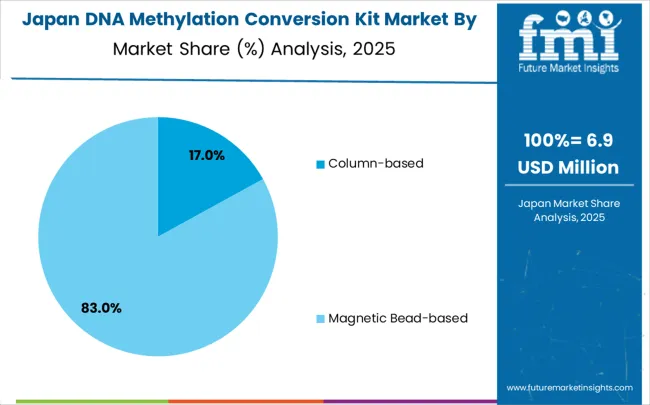
The DNA methylation conversion kit market in Japan is growing at a CAGR of 7.5%, driven by research and clinical applications in genomics, epigenetics, and precision medicine. Japan’s life sciences and pharmaceutical sectors adopt DNA methylation conversion kits to support disease research, drug development, and genetic studies. Investments in advanced laboratory infrastructure and collaborations between academic and industry players further enhance market growth. Although growth is slower than in emerging markets, Japan’s focus on quality, accuracy, and technological integration ensures steady adoption of these kits in both research and clinical settings.
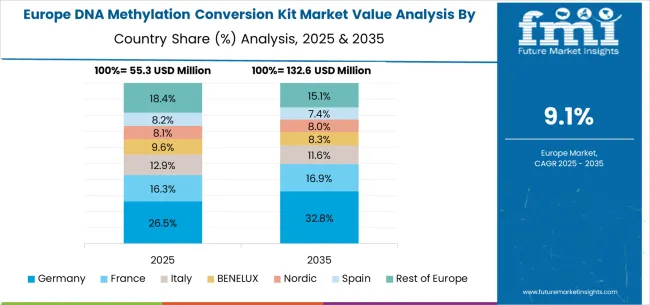
The DNA methylation conversion kit market in Europe is projected to grow from USD 55.3 million in 2025 to USD 132.6 million by 2035, registering a CAGR of 9.1% over the forecast period. Germany is expected to remain the largest national market with 26.5% share in 2025, rising to 32.8% by 2035, supported by its advanced biotechnology sector, strong genomics research infrastructure, and leadership in molecular diagnostics. The United Kingdom follows with 16.3% in 2025, steady at 16.9% by 2035 as academic-industry collaborations and adoption in clinical diagnostics strengthen. France accounts for 16.2% in 2025, easing slightly to 11.6% by 2035, reflecting steady but mature adoption in research and pharmaceutical sectors.
Italy holds 9.6% in 2025, softening to 8.3% by 2035, while Spain represents 9.6% in 2025, moderating to 8.2% by 2035, as demand grows in academic and clinical laboratories. BENELUX countries contribute 8.2% in 2025, easing to 7.4% by 2035, while the Nordic region accounts for 8.4% in 2025, moderating to 8.0% by 2035, reflecting mature uptake in advanced research ecosystems. The rest of Europe (Eastern Europe and other emerging markets) collectively accounts for 18.4% in 2025, easing to 15.1% by 2035, supported by ongoing investments in biotechnology infrastructure and expanding adoption in emerging research hubs.
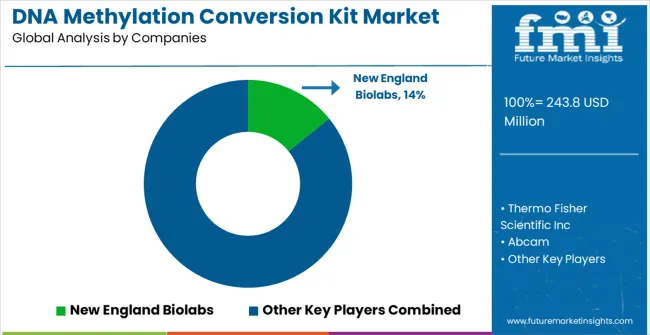
The DNA methylation conversion kit market is characterized by competition among established life sciences companies, specialized molecular biology manufacturers, and integrated biotechnology solution providers. Companies are investing in advanced conversion technology research, product innovation, quality assurance, and comprehensive product portfolios to deliver reliable, efficient, and high-performance DNA methylation conversion kit solutions. Innovation in automation compatibility, next-generation sequencing integration, and specialized conversion chemistries is central to strengthening market position and competitive advantage.
New England Biolabs leads the market with comprehensive molecular biology solutions, offering advanced DNA methylation conversion kits with a focus on conversion efficiency and downstream analysis compatibility across diverse epigenetic research applications. Thermo Fisher Scientific Inc. provides specialized life sciences products with an emphasis on research reliability and comprehensive workflow integration. Abcam delivers innovative research tools with a focus on antibody-based applications and molecular biology reagents. Merck specializes in life science technologies with emphasis on research quality and analytical precision. Vazyme focuses on molecular biology enzymes and kits with emphasis on innovation and research support. MGI-Tech offers comprehensive genomics solutions with an emphasis on sequencing technologies and molecular analysis.
| Items | Values |
|---|---|
| Quantitative Units (2025) | USD 243.8 million |
| Processing Method | Column-based, Magnetic Bead-based, Others |
| Application | Research Institutions, Medical Institutions, University Research, Others |
| Regions Covered | Asia Pacific, North America, Europe, Latin America, Middle East & Africa |
| Countries Covered | China, India, Germany, Brazil, the United States, the United Kingdom, Japan, and 40+ countries |
| Key Companies Profiled | New England Biolabs, Thermo Fisher Scientific Inc., Abcam, Merck, Vazyme, and MGI-Tech |
| Additional Attributes | Dollar sales by processing method and application category, regional demand trends, competitive landscape, technological advancements in conversion systems, automation development, NGS compatibility innovation, and epigenetic research optimization |
The global DNA methylation conversion kit market is estimated to be valued at USD 243.8 million in 2025.
The market size for the DNA methylation conversion kit market is projected to reach USD 632.3 million by 2035.
The DNA methylation conversion kit market is expected to grow at a 10.0% CAGR between 2025 and 2035.
The key product types in DNA methylation conversion kit market are column-based and magnetic bead-based.
In terms of application, research institutions segment to command 50.0% share in the DNA methylation conversion kit market in 2025.






Our Research Products

The "Full Research Suite" delivers actionable market intel, deep dives on markets or technologies, so clients act faster, cut risk, and unlock growth.

The Leaderboard benchmarks and ranks top vendors, classifying them as Established Leaders, Leading Challengers, or Disruptors & Challengers.

Locates where complements amplify value and substitutes erode it, forecasting net impact by horizon

We deliver granular, decision-grade intel: market sizing, 5-year forecasts, pricing, adoption, usage, revenue, and operational KPIs—plus competitor tracking, regulation, and value chains—across 60 countries broadly.

Spot the shifts before they hit your P&L. We track inflection points, adoption curves, pricing moves, and ecosystem plays to show where demand is heading, why it is changing, and what to do next across high-growth markets and disruptive tech

Real-time reads of user behavior. We track shifting priorities, perceptions of today’s and next-gen services, and provider experience, then pace how fast tech moves from trial to adoption, blending buyer, consumer, and channel inputs with social signals (#WhySwitch, #UX).

Partner with our analyst team to build a custom report designed around your business priorities. From analysing market trends to assessing competitors or crafting bespoke datasets, we tailor insights to your needs.
Supplier Intelligence
Discovery & Profiling
Capacity & Footprint
Performance & Risk
Compliance & Governance
Commercial Readiness
Who Supplies Whom
Scorecards & Shortlists
Playbooks & Docs
Category Intelligence
Definition & Scope
Demand & Use Cases
Cost Drivers
Market Structure
Supply Chain Map
Trade & Policy
Operating Norms
Deliverables
Buyer Intelligence
Account Basics
Spend & Scope
Procurement Model
Vendor Requirements
Terms & Policies
Entry Strategy
Pain Points & Triggers
Outputs
Pricing Analysis
Benchmarks
Trends
Should-Cost
Indexation
Landed Cost
Commercial Terms
Deliverables
Brand Analysis
Positioning & Value Prop
Share & Presence
Customer Evidence
Go-to-Market
Digital & Reputation
Compliance & Trust
KPIs & Gaps
Outputs
Full Research Suite comprises of:
Market outlook & trends analysis
Interviews & case studies
Strategic recommendations
Vendor profiles & capabilities analysis
5-year forecasts
8 regions and 60+ country-level data splits
Market segment data splits
12 months of continuous data updates
DELIVERED AS:
PDF EXCEL ONLINE
DNA Diagnostics Market Size and Share Forecast Outlook 2025 to 2035
DNA Microarray Market Forecast Outlook 2025 to 2035
DNA-Modified Plant Extracts Market Analysis - Size and Share Forecast Outlook 2025 to 2035
DNA-Repair Enzymes Market Analysis - Size, Share, and Forecast Outlook 2025 to 2035
DNA Chromatography Chips Market Size and Share Forecast Outlook 2025 to 2035
DNA Polymerase Market Analysis - Size, Share, and Forecast 2025 to 2035
DNA Sequencing Services Market Trends - Growth & Forecast 2025 to 2035
DNA Synthesis Market Growth - Trends & Forecast 2025 to 2035
DNA-Based Skin Care Market – Trends & Forecast 2025 to 2035
DNA/RNA Extraction Market Growth & Demand 2025 to 2035
DNA Sequencing Electrophoresis Systems Market
DNA modifying agents Market
DNA Methylation Market Size and Share Forecast Outlook 2025 to 2035
cDNA Synthesis Market
Pet DNA Testing Market Analysis by Animal Type, Sample Type, Test Type, End User and Region: Forecast for 2025 to 2035
Japan DNA Polymerase Market Analysis – Growth, Applications & Outlook 2025-2035
Cosmid DNA Isolation Market
Germany DNA Polymerase Market Trends – Size, Share & Growth 2025-2035
Handheld DNA Reader Market Size and Share Forecast Outlook 2025 to 2035
Enzymatic DNA Synthesis Market Size and Share Forecast Outlook 2025 to 2035

Thank you!
You will receive an email from our Business Development Manager. Please be sure to check your SPAM/JUNK folder too.
Chat With
MaRIA